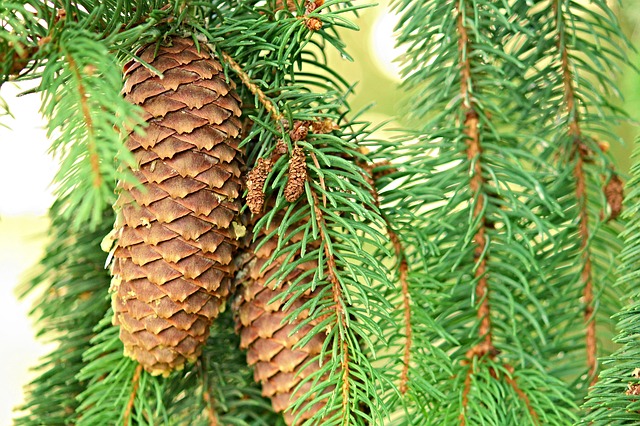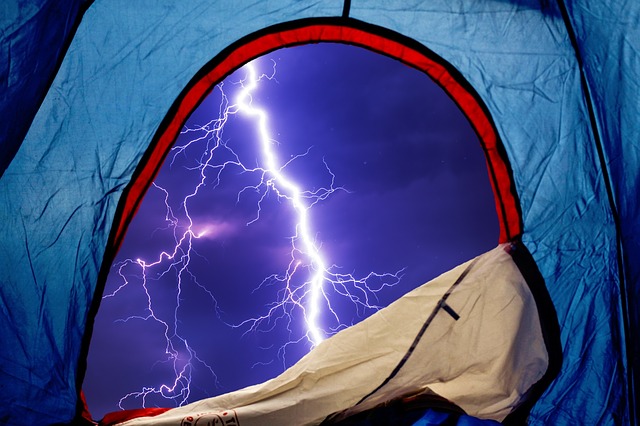Camping is a great recreational outdoor activity, and it’s even better sharing the experience with other people.
However, too many times have I seen people pitching their tents in the wrong places, leaving them in bad situations when a sudden storm strikes in the night.
I’ve finally had enough!
I’m tired of seeing it happen and want to show you EXACTLY where you should NEVER pitch your tent.
Somewhere Illegal

This is the first rule in the book…well, the unwritten book of camping anyway.
This is not mentioned much (or hardly anywhere), and it leads to people getting in trouble with the law.
So before you do ANY type of camping, please make sure you are allowed to pitch your tent in that area in the first place.
Getting in trouble with the law is never a good thing.
Near Ditches, Valleys, or Low-Lying Areas
Pitching your tent in a ditch, valley, or low-lying area means you are prone to getting wiped out in a sudden storm.
Valleys and ditches are the worst. They fill up with water the quickest.
Often times we pitch our tents in these areas thinking we’re going to be safe from the hot sun, wind, and side rain, but that is never the case and it only makes our situation worst.
Near Rivers and Streams
Calmly-flowing rivers and streams become raging rivers as soon as the wind and rain picks up.
Rivers become dangerous and rise very quickly.
If you pitch your tent near one you risk waking up with your entire campsite washed away while you’re in the middle of a flowing river.
And yes, it really is as bad as it sounds.
Under Coconut or Pine Trees

Coconuts and pine cones fall all the time.
This should be common sense, but I still people making this silly mistake.
They are extremely painful when they drop on you.
Strong winds blow trees in the middle of the night. You have a chance of getting a dong on the head!
It’s even worse when you have kids and babies in your tent.
Under Dead Branches
Pretty self-explanatory really.
These can and will fall to kill you.
Dead branches are a ticking time bomb my friend.
It’s just a matter of time before they drop, and whatever is under it will get crushed.
Don’t be another statistic and do the right thing instead.
Do not pitch your tent under a dead branch if you want to live.
On Uneven Ground (on slopes and hills)
Pitching your tent on uneven ground is uncomfortable and an all-round bad idea.
You need to know this now before you find out the hard way.
If you pitch your tent on a slight hill, you will most likely roll over in the night, brush up against the wall of the tent and end up saturated in condensation.
Not to mention the aches and pains you will get too!
Close to Other Campers (unless you have to)
I wish somebody told me that camping by random people was a bad idea in the beginning of my camping journey.
First you have the family with kids that get up at 4-5 in the morning and wake up the rest of the family.
They are extremely loud, so they end up waking the entire campsite up. Now no one can get back to sleep.
Everyone just ends up getting out of bed (this early on a vacation?!).
Then you have the party goers. They seem to be on the trip just to drink, be loud and party. This goes until some ungodly hour.
Bottom line, stay away from other campers if you can help it.
Not Too Close To High Trees
Stay away from tree bases and you will be fine.
In the event lightning strikes the tree you are pitched by, you will be safe because the lightning will stop before it can reach you.
However, if you decide to pitch your tent right next to it, you will be toast. And that’s literally.
Lightning travels through the ground and bounces off of objects, so staying away from tall objects is key for staying safe.

Soft Ground
Placing stakes into soft ground is a bad idea.
Even just one gust of wind can rip half of them out and leave your tent flapping about in the wind.
You’re better off spending an extra half hour finding hard soil.
But if you can not, at least secure them with stones and logs, and maybe even tie them around trees or bushes if you have to.
Mother nature is there to help us, so use everything available to you.
With the Door Facing The Wind
The wind can AND will fly into the door of your tent, pick it up, rip it out of the ground and take it halfway across the campsite.
I’ve actually seen this happen!
It sounds a little far-fetched right now, but it does happen, and more than you think.
So do not pitch your tent until you have a general idea of the wind direction, or face the consequences later.
Out of Sight
Pitch your tent so it’s in your field of view 90% of the time.
Critters like to be nosy. They go searching anytime, day and night, mostly looking for food.
===> Keep your food safe from critters
So keep your campfire near your tent, always keep food out, and try to leave the door closed, because that’s where you’ll be most of the time.
If you leave the doors and windows open for ventilation make sure all food is out first.
You don’t want to come back to a destroyed tent!
Final Opinion
In short, some of these are minor and some of them are major.
The questions you should be asking yourself when pitching your tent is:
Is the location comfortable, and will it become a problem should the weather play an influence?
If you ask yourself those two questions every time you pitch your tent you will always find a good spot to camp in.
That I can promise.
Comfort is on a completely flat surface that’s free of bumps and objects, such as sticks and rocks.
I’ve had an expensive sleeping pad in the past that didn’t even help me stay comfortable, JUST because there was a slight slope in the ground.
Also, objects rubbing on the floor of the tent will decrease the life expectancy and may even puncture the groundsheet.
Well thanks for reading.
I hope you learned a thing or two in this article. Leave a comment below if you did!
